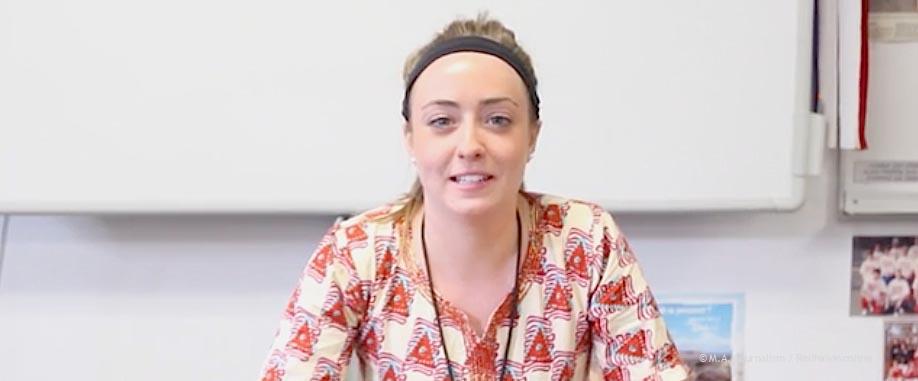Minnehaha Alumnus Vera Morbey (’09) discusses the recent outbreak of Ebola in Western Africa with Minnehaha filmmaker Kate Brown.
Language classes lead to passports, adventures and service beyond high school
“A year ago, I would not have thought I would be here,” says Kate Pitchford (’10), a volunteer with Wycliffe, a missions group, in Benin. “Honestly, this was so not on my radar.”
“It’s not that I was opposed to doing international missions work, but I just thought, ‘That’s not my calling.’ You know the body of Christ? That [missions work] is not my part of the body. I was praying and I wasn’t sure what it was supposed to feel like when God told me where to go. You can’t really know how to pray for that. When people say it, it’s always ‘Oh, yeah, God just talked to them.’ That didn’t happen for me.”
Pitchford is one of three recent M.A. graduates who have worked in western Africa, along with Vera Morbey (’09) and Heidi Anderson (’07). Both volunteered with the Peace Corps in Guinea and Benin, respectively. All three are former French students who have used their language skills to help them do community work with their organizations. The work has proven rewarding, and at the same time, heartbreaking. They have had many experiences between the three of them, and all three share a common base: Minnehaha.
“I would say M.A. was where I really started to love learning French,” says Pitchford, “which was a big part of me deciding to go to west Africa, because they speak French here.” Not only do they speak French, but every region of west Africa also has its own regional tongue.
“Everyone speaks French, but they also speak Fon, which is just a regional language. Everyone in this part of Benin speaks it, and so it’s been funny, because they’re trying to teach me phrases.”
Heidi Anderson had a different perspective going into the volunteer process, “I wanted to do some sort of international work after college, and I really liked the way the Peace Corps application process worked; where you apply, and you don’t get to choose where you go, they just kind of send you. They match you to a program and a country, and I thought that was cool.”
When Anderson got to Africa, she worked as an environmental action volunteer, part of which included Anderson helping to run environmental camps to help educate students about their world.
“My last big project as a Peace Corps volunteer, at the end of the 26 months for me, was running a week-long environment camp for secondary school students, and I helped to organize the whole thing. I worked with 12 other Peace Corps volunteers also in the country, and we all brought two to four students from our respective villages to participate in the camp.”
Anderson describes that as one of the most challenging experiences she had while in Benin. “But it was the most rewarding, too, I think. That’s probably the most memorable experience I had as a Peace Corps volunteer was being able to do this camp. It’s also probably the biggest thing I did all in French, just being able to teach lessons.”
However, although the work may have been rewarding — and it was for Vera Morbey — the culmination of the experience Lent itself to a more somber mood.
As the Ebola situation in Africa and elsewhere around the world continues to unfold, many lives are being lost and none of us really know the people it is affecting.
Vera Morbey does.
Morbey was reaching the end of the first stage of her work, which was a lot of community outreach and meeting the people whom she would be working with for the next year and a half. “I spent a lot of time just going to different group meetings,” said Morbey, “going to different peanut and rice fields, going to different marriages and just getting to know the community.”
So when the news came, in March that there was Ebola in Guinea, people started to worry. “After the first cases were being publicized, people would wear face masks,” said Morbey, “everyone was washing their hands, now.”
The saddening part of the journey started when she was traveling to the capital city of Conakry with friends for a birthday party. “I was on my way, and then I got a text saying that we were all being evacuated. I didn’t really understand it at first, I thought it might have been a joke.” But it wasn’t.
“I ended up having to spend the night at a friend’s house in a city on the way to Conakry. Then I had to go back to my village, and I was at my village for four hours. I had to pack my bags,” said Morbey.
And the worst part came when she was just about to leave. “I had to explain to everyone that I was leaving because, ‘Your country is not safe for you, but I’m allowed to leave.’ So I felt very awful having to do that.” She was leaving behind people that she had gotten to know for eight months, lived amongst for eight months and planned to be with for another 19. Imagine that feeling, and think on it. How could you not want to go back, reunite with old friends and finish what you started?
Vera Morbey does.

